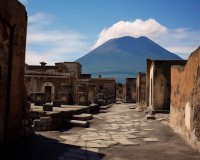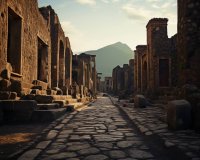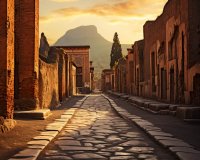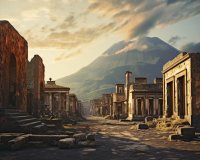Ultimate Guide to Exploring Pompeii and Surrounding Areas
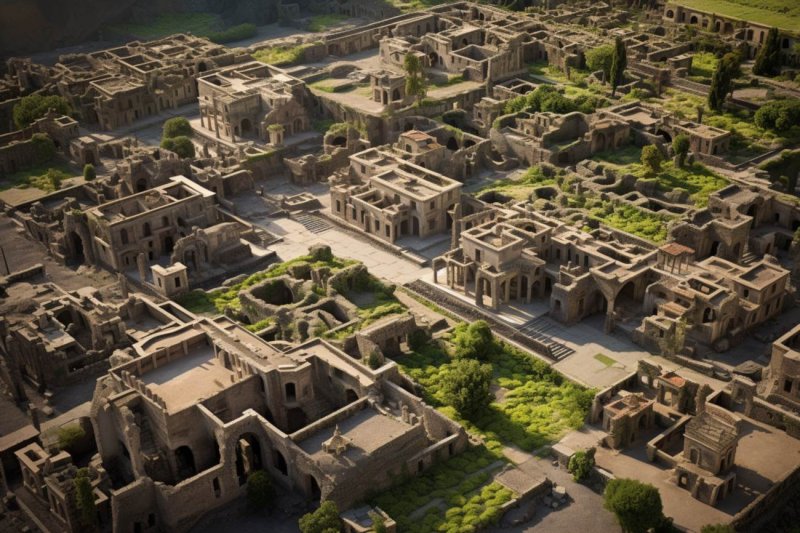
The Ultimate Guide to Exploring Pompeii and Surrounding Areas
Pompeii, a city frozen in time, offers an incredible glimpse into the daily life of the ancient Romans. Nestled in the shadow of Mount Vesuvius, this UNESCO World Heritage site is a must-visit for history enthusiasts, archaeology buffs, and anyone looking to immerse themselves in the rich history of Italy. In this ultimate guide, we'll explore everything you need to know about visiting Pompeii and the surrounding areas.
Getting to Pompeii
Before we delve into the wonders of Pompeii, it's essential to know how to get there. The city is located in the Campania region of Italy, near Naples. You can reach Pompeii by:
- Train: The Circumvesuviana train from Naples is a convenient and cost-effective option. It takes approximately 30 minutes to reach Pompeii.
- Car: If you prefer driving, you can rent a car and follow the A3 motorway to Pompeii. There's ample parking available near the archaeological site.
Exploring Pompeii
Once you arrive in Pompeii, you'll find yourself in a sprawling archaeological park that's best explored on foot. Here are some key attractions and tips for your visit:
| Attraction |
Description |
| Pompeii Forum |
The heart of the city, where political, religious, and commercial activities took place. Explore the Temple of Jupiter, the Basilica, and the Macellum. |
| Villa of the Mysteries |
Admire well-preserved frescoes and learn about the mysteries of the cults celebrated in this elegant villa. |
| Amphitheatre |
Witness the grandeur of Roman entertainment in one of the oldest surviving amphitheaters in the world. |
Make sure to wear comfortable walking shoes, carry water, and wear sunscreen, as there is limited shade within the archaeological site. Guided tours are available and highly recommended to gain a deeper understanding of the history and significance of each location.
Visiting Herculaneum
While in the area, consider exploring Herculaneum, another ancient Roman city destroyed by the eruption of Mount Vesuvius. It's a short train ride from Pompeii and offers a different perspective on Roman life. Highlights of Herculaneum include the well-preserved wooden structures and the House of the Neptune and Amphitrite mosaic.
Mount Vesuvius
If you're feeling adventurous, don't miss the opportunity to hike Mount Vesuvius. The volcano that buried Pompeii is still active, but guided tours lead you to its summit, where you can peer into the crater and enjoy breathtaking views of the Bay of Naples.
Enjoying Local Cuisine
Exploring Pompeii can work up an appetite, and the surrounding area offers fantastic culinary experiences. Be sure to sample local specialties, including Neapolitan pizza, fresh seafood, and limoncello, a lemon liqueur that's famous in this region.
Practical Information
Before your trip, keep these practical tips in mind:
- Opening Hours: Pompeii is open daily, but hours may vary depending on the season. Check the official website for up-to-date information.
- Tickets: You can purchase tickets at the entrance, but consider buying them online in advance to skip the lines.
- Weather: Check the weather forecast before your visit and dress accordingly. Summers can be scorching, so sun protection is a must.
In conclusion, exploring Pompeii and its surrounding areas is a journey back in time, a chance to witness the glory and tragedy of an ancient city. From the well-preserved ruins of Pompeii to the unique insights offered by Herculaneum and the breathtaking views from Mount Vesuvius, this region is a treasure trove of historical and natural wonders.
So, pack your bags, put on your adventure hat, and get ready to immerse yourself in the captivating history of Pompeii and its surroundings. You won't be disappointed.
Pompeii and Herculaneum Private Tour from Naples
Embark on a fascinating journey to the ancient towns buried by the eruption of Mount Vesuvius in 79 A.D. with a private tour from Naples. Delve into the rich history and culture of Pompeii and Herculaneum with the expertise of a knowledgeable guide.
About this Activity
Explore the UNESCO heritage site of Pompeii, a city frozen in time by the eruption. Marvel at the Roman architecture, from shops and squares to brothels, and witness the preservation of entire human bodies in lava. After absorbing the history of Pompeii, continue your adventure to Herculaneum, a city founded by Hercules. Despite its smaller size, Herculaneum offers an equally captivating guided tour.
During your return journey, take a fascinating detour to a local workshop, where you can witness the craftsmanship of genuine Cameos. Your private driver ensures a seamless and comfortable 6-hour experience, making this tour an enriching exploration of Italy's ancient past.
Highlights
- Discover both Herculaneum and Pompeii with a private guide
- Learn about Roman history and culture
- Enjoy the services of a private driver for 6 hours
Includes
- Private driver and car
- Tour guide
- Pompeii entrance fee
- Herculaneum entrance fee
- Lunch
Customer Reviews
Overall rating: 4.9/5 based on 7 reviews
Review Summary
- Guide: 5/5
- Transportation: 5/5
- Value for Money: 4.5/5
What Travelers Are Saying
"Very well organized trip with effortless pick up at our hotel in Naples by a professional driver and rendezvous with our superb tour guide for Pompeii and Herculaneum. We would not have gotten nearly as much out of the experience without Elise. She was knowledgeable on all details and sites and best approaches. Highly recommend this group!" - Allitia, United States
Important Information
Wear comfortable shoes
Price
From $537.02 per person
The History and Fall of Pompeii
Pompeii, a city in ancient Rome, is perhaps best known for its tragic and dramatic end. This article delves into the history, culture, and the fateful eruption of Mount Vesuvius that led to the fall of Pompeii.
Historical Background
Founded in the 6th century BC by the Osci people, Pompeii was later conquered and influenced by the Greeks and Etruscans. However, it was the Romans who made significant contributions to the city's development. By the 1st century AD, Pompeii was a bustling Roman town with a population of approximately 20,000 inhabitants.
The city thrived as a center for trade, agriculture, and industry. It was known for its fertile soil, producing a variety of agricultural products, including wine and olive oil. Pompeii's location, near the Bay of Naples, also made it a popular destination for vacationing Romans.
Everyday Life in Pompeii
Pompeii offers a fascinating glimpse into daily life in ancient Rome. The city was well-planned, with a grid of streets, public buildings, and private homes. The Pompeians had access to numerous amenities, such as public baths, markets, theaters, and temples.
One of the most remarkable aspects of Pompeii is its state of preservation. The volcanic ash and debris from the eruption of Mount Vesuvius in 79 AD buried the city, preserving its buildings, frescoes, and even organic materials like wood and food. Archaeological excavations have revealed an incredible amount of information about the daily lives of the city's inhabitants.
The Eruption of Mount Vesuvius
On August 24, 79 AD, Mount Vesuvius, the nearby volcano, erupted with terrifying force. The eruption was catastrophic, sending a towering plume of ash and pumice into the sky. A rain of hot ash and rock fell upon the city, quickly burying it under several meters of debris.
The eruption of Vesuvius was so sudden that many of Pompeii's residents were caught completely off guard. The high temperatures and toxic gases from the volcano caused instant death for many, while others sought refuge in their homes or attempted to flee. Unfortunately, for most, escape was impossible.
Rediscovery of Pompeii
For centuries, Pompeii lay hidden beneath the earth, its existence forgotten. It was only in the 18th century that the city was rediscovered during excavations. Archaeologists began to unearth the well-preserved buildings, artifacts, and human remains, shedding light on this ancient civilization.
Today, the archaeological site of Pompeii is a UNESCO World Heritage Site and a popular tourist destination, attracting millions of visitors from around the world each year.
Legacy and Impact
The legacy of Pompeii is profound. It provides invaluable insights into the daily life, art, and architecture of ancient Rome. The city's preserved frescoes, mosaics, and buildings have significantly enriched our understanding of the Roman world.
Furthermore, the tragic fate of Pompeii serves as a stark reminder of the power and unpredictability of nature. The eruption of Mount Vesuvius, while devastating, has left a unique record for future generations, making Pompeii one of the most significant archaeological sites in the world.
In conclusion, the history and fall of Pompeii are a testament to the rise and fall of civilizations, the resilience of the archaeological record, and the importance of understanding our past. The city's story continues to captivate and educate people worldwide, offering a window into the lives of those who once called Pompeii home.
Half-Day Pompeii Tour from Naples Cruise Terminal
Experience a journey back to the days of the Roman Empire with a half-day cruise excursion to Pompeii. This exclusive tour offers the services of a private guide and convenient round-trip transportation from the cruise terminal in the Port of Naples.
Duration: 4 hours
About this Activity
Free Cancellation: Cancel up to 24 hours in advance for a full refund. Reserve now & pay later to keep your travel plans flexible — book your spot and pay nothing today. Special Covid-19 precautions are in place. Check your activity voucher once you book for full details.
Highlights
- Enjoy a 2-hour guided tour of Pompeii.
- Learn about the tragic eruption of Mt. Vesuvius in 79 AD.
- Journey back in time to the days of the Roman Empire.
Full Description
Explore the archaeological excavations of Pompeii on a half-day cruise excursion, and benefit from round-trip transportation from the cruise terminal in the Port of Naples. Journey directly from your ship to Pompeii in just 30 minutes. Upon arrival, meet your guide and enter the main gate for a 2-hour private tour of the legendary ruins. Travel back in time as you learn the story about how the everyday city of the Roman Empire was reduced to rubble by the eruption of Mt. Vesuvius. Return to Naples in time to catch the evening entertainment or the departure of your cruise ship.
Includes
- Round-trip transfer in private coach.
- Local guide in Pompeii ruins.
- Admission fee to Pompeii (€16 per person).
Meeting Point
Pick-up from the Port of Naples.
Likely to sell out. From $474.77 per group (up to 3 participants).
Customer Reviews
Overall Rating: 4.9/5 based on 9 reviews.
Review Summary:
- Value for Money: 5/5
- Safety: 5/5
- Service: 5/5
- Organization: 5/5
Famous Landmarks of Pompeii
Pompeii is one of Italy's most iconic and historically significant cities. Located near Naples in the Campania region, Pompeii is renowned for its well-preserved ancient ruins, frozen in time by the catastrophic eruption of Mount Vesuvius in 79 AD. The city offers a glimpse into daily life during the Roman Empire, with numerous famous landmarks that continue to captivate visitors from around the world.
Pompeii Amphitheatre
The Pompeii Amphitheatre, also known as the Anfiteatro Romano, is a spectacular archaeological site that stands as one of the most well-preserved Roman amphitheaters in the world. Built around 70 BC, it could hold up to 20,000 spectators. This arena was used for various forms of entertainment, from gladiator battles to theatrical performances, making it a central part of Pompeii's social and cultural life.
House of the Faun
The House of the Faun, or Domus Fauni, is a luxurious villa in Pompeii that reflects the opulence and grandeur of Roman aristocracy. It derives its name from a prominent bronze statue of a dancing faun found within the house. The villa is known for its stunning frescoes, including the famous Alexander Mosaic, and its impressive layout, which spans an entire city block.
Pompeii Forum
The Pompeii Forum, or Forum of Pompeii, was the heart of the city's political, commercial, and social activities. This rectangular open space was surrounded by important buildings, including the Basilica, temples dedicated to various deities, and a marketplace. The grandeur of the Pompeii Forum showcases the city's significance during the Roman era.
Temple of Apollo
The Temple of Apollo, dedicated to the Roman god of prophecy, music, and the arts, is one of the most recognizable structures in Pompeii. Its iconic columns and well-preserved podium make it a symbol of the city's ancient glory. Visitors can explore this sacred site and marvel at its historical significance.
Pompeii's Streets and Homes
Beyond these famous landmarks, the streets of Pompeii are a treasure trove of insights into daily life during Roman times. The city's layout, complete with narrow, winding streets, showcases the urban planning of the period. Many houses still bear witness to the lifestyles of their former inhabitants, with frescoes, courtyards, and intricate mosaics that depict the tastes and values of Pompeii's residents.
Visiting Pompeii Today
Today, Pompeii is a UNESCO World Heritage Site, drawing tourists, archaeologists, and history enthusiasts alike. It provides a unique opportunity to step back in time and immerse oneself in the world of ancient Rome. As you explore the ruins, you can't help but wonder about the lives of those who once walked these streets and inhabited these grand houses.
Visitors can also visit the Antiquarium of Pompeii, a museum housing artifacts and displays that further illuminate the city's history and the eruption of Mount Vesuvius. The plaster casts of the victims, created by pouring plaster into voids left by decaying bodies, offer a haunting and powerful testament to the disaster that preserved the city for centuries.
In conclusion, Pompeii's famous landmarks, including the amphitheater, House of the Faun, Forum, Temple of Apollo, and its well-preserved streets and homes, make it a remarkable destination for anyone interested in ancient history. The city's tragic fate at the hands of Mount Vesuvius has given us an unparalleled window into the past, and visiting Pompeii is an unforgettable experience that takes you on a journey through time.



